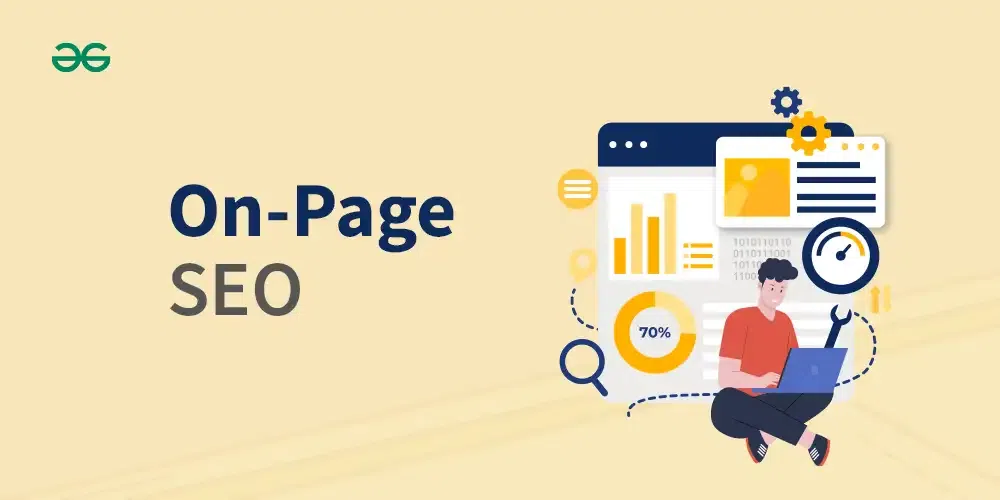On Page SEO Optimization | Definition, Importance and Strategies
Last Updated :
21 Mar, 2024
Have you ever wondered why some websites appear at the first of SERPs? It’s all about page SEO, it’s an important ingredient for online visibility. With smart on page SEO strategies, we can easily rank our website at the top of the result pages.

On Page SEO Optimization | Definition, Importance and Strategies
What is On Page SEO
On page SEO refers to the optimization techniques applied directly to a website’s pages to enhance their visibility and ranking in search engine results. It involves optimizing content, HTML source code, and other on-page elements to align with search engine algorithms.
Elements of On page SEO

Elements of On Page SEO
On-page SEO is the practice of optimizing individual web pages to rank higher in search engine results pages (SERPs). The elements of on-page SEO in the image are:
- Title Tag: This is the title of your web page, which appears in the search engine results pages (SERPs) and at the top of your browser window. It should be descriptive and relevant to the content of your page.
<head><title> Your Title </title></head>
This is a default code for title tag, given below is title tag of this current page.

Title Tag of this Page
- Meta Description: This is a brief description of your web page that appears in the search engine results pages (SERPs) under the title tag. It should be informative and enticing, and should encourage users to click on your page.

Meta Description
- Headers: These are the headings and subheadings on your web page. They break up your content and make it easier to read. They also help search engines understand the structure of your page.
- Tags: These are keywords that describe the content of your web page. They help search engines understand what your page is about and when to show it in the search results.
- Images: Images can help to break up your text and make your page more visually appealing. They can also be used to improve your search engine ranking, but make sure they are relevant to your content and have alt tags.
- External Links: These are links to other websites. Linking to high-quality websites can help to improve your website’s credibility and authority.
- Internal Links: These are links to other pages on your website. Linking to related pages can help to keep users on your website longer and improve your website’s ranking in search results.

Internal and External Link (On-Page SEO)
- Content: This is the main body of your web page. It should be well-written, informative, and relevant to your target audience.
On-page SEO focuses on optimizing factors within the website itself, such as content quality, keywords, and HTML tags. Off-page SEO, on the other hand, involves external factors like backlinks, social signals, and overall online presence. While on-page SEO is within your control, off-page SEO involves factors influenced by external sources.
Why Is On Page SEO Important?
On-page SEO is important due to following reasons:
- Search Engine Visibility: Proper on page optimization improves your chances of ranking higher in search engine results, making your website more visible to users.
- User Experience: On-page SEO techniques, such as optimized content and organized structure, contribute to a positive user experience, enhancing navigation and readability.
- Relevance to Searches: By incorporating relevant keywords, title tags, and meta descriptions, on-page SEO ensures that your content aligns with user search queries, increasing the likelihood of attracting the right audience.
- Competitive Advantage: Well-optimized on-page elements give you a competitive edge in the online landscape, helping your site stand out among others in your niche.
- Mobile Responsiveness: With the increasing use of mobile devices, mobile optimization is vital for on-page SEO. Google prioritizes mobile-friendly websites, impacting rankings and user experience positively.
On Page SEO Benefits
On-page SEO isn’t just about climbing the search engine ladder. It’s about building a loyal crew of visitors who engage with your content, trust your brand, and ultimately become customers.
- Improved Search Engine Rankings:
- Optimizing on-page elements such as meta tags, headings, and content helps search engines understand the relevance and context of your web pages. This can result in higher rankings for relevant search queries.
- Increased Organic Traffic:
- Higher search engine rankings generally lead to increased visibility and click-through rates. This, in turn, can bring more organic traffic to your website.
- Better User Experience:
- On-page SEO involves optimizing for user experience, including site structure, navigation, and the overall design. A well-optimized website is more likely to provide a positive experience for visitors, encouraging them to stay longer and explore more pages.
- Reduced Bounce Rates:
- By providing relevant and valuable content, optimizing page load times, and ensuring a user-friendly design, you can reduce bounce rates. This is important as lower bounce rates are often associated with higher search engine rankings.
- Enhanced Mobile Optimization:
- With the increasing use of mobile devices, search engines like Google prioritize mobile-friendly websites. On-page SEO includes optimizing for mobile, ensuring that your site is accessible and performs well on various devices.
Conclusion
In conclusion, the key to success online is learning all aspects of On Page SEO. This guide has emphasized the significance, defined the concept, and provided feasible solutions. By carefully using these insights, you enable your website to move up the search engine results page, ensuring ongoing exposure and significance in the online environment.
Share your thoughts in the comments
Please Login to comment...